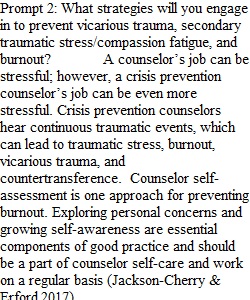


Q Vicarious Trauma This week you learned that vicarious trauma, compassion fatigue, and burnout are common in crisis counseling work. Preventative efforts are necessary to mitigate the potential of these concerns. For your second discussion, respond to this question: What strategies will you engage in to prevent vicarious trauma, secondary traumatic stress/compassion fatigue, and burnout? Post your main discussion by Day 4. Read a selection of your colleagues' postings. Note the change in number of required responses due to the double-discussion this week. Respond by Day 6 to at least 2 of your colleagues who chose different points to address. Expand on your colleague’s posting in one of the following ways: • Discuss resources available to assist counselors with vicarious trauma. How could a counselor access those resources? • What barriers might exist to managing wellness? • Discuss an article from the Lamar library that addresses vicarious trauma or burnout. Use examples to support your ideas. Be sure to cite your points using the learning resources. You may also use other scholarly literature to support your discussion. Citations and references must be in APA format. Peer Response Requirements: Respond to at least 2 of your peers with substantive responses and support these responses with references to be eligible for full points. Peer responses must occur on at least 2 separate days.
View Related Questions